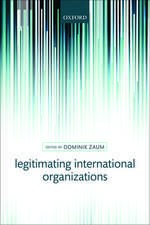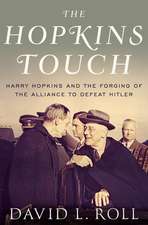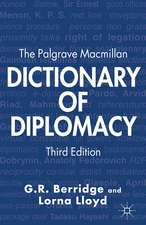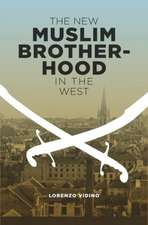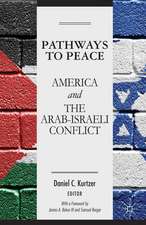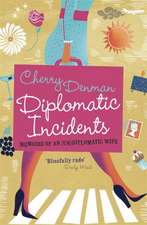The Fog of Peace: The Human Face of Conflict Resolution
Autor Gabrielle Rifkind, Giandomenico Piccoen Limba Engleză Hardback – 6 apr 2017
| Toate formatele și edițiile | Preț | Express |
|---|---|---|
| Paperback (1) | 176.39 lei 6-8 săpt. | |
| Bloomsbury Publishing – 29 aug 2016 | 176.39 lei 6-8 săpt. | |
| Hardback (1) | 354.59 lei 3-5 săpt. | |
| Bloomsbury Publishing – 6 apr 2017 | 354.59 lei 3-5 săpt. |
Preț: 354.59 lei
Preț vechi: 386.85 lei
-8% Nou
Puncte Express: 532
Preț estimativ în valută:
67.87€ • 73.75$ • 57.05£
67.87€ • 73.75$ • 57.05£
Carte disponibilă
Livrare economică 31 martie-14 aprilie
Preluare comenzi: 021 569.72.76
Specificații
ISBN-13: 9781780768977
ISBN-10: 1780768974
Pagini: 288
Dimensiuni: 135 x 216 x 30 mm
Greutate: 0.45 kg
Editura: Bloomsbury Publishing
Colecția I.B.Tauris
Locul publicării:London, United Kingdom
ISBN-10: 1780768974
Pagini: 288
Dimensiuni: 135 x 216 x 30 mm
Greutate: 0.45 kg
Editura: Bloomsbury Publishing
Colecția I.B.Tauris
Locul publicării:London, United Kingdom
Notă biografică
Gabrielle Rifkind is the Director of the Middle East programme at Oxford Research Group. She is a group analyst and specialist in conflict resolution immersed in the politics of the Middle East. Rifkind combines in-depth political and psychological expertise with many years' experience in promoting serious analysis and discreet dialogues with groups behind the scenes. Giandomenico Picco served for over two decades as a UN official. Among his work, he led the UN efforts which brought about the release of many of the Western hostages from Lebanon and the agreement which ended the Iran Iraq war. He has been a consultant in the private sector as Chairman of GDP Associates, a USA based company. He has published articles and co-authored books on matters related to the larger Middle East, among other subjects.
Cuprins
ContentsPrefaceIntroductionThe Inhuman Face of PeacemakingPRACTICE NOT THEORYA so-called diplomat's story by Gianni PiccoA personal storyLife lessons applied: freeing hostages in LebanonFinding the Iranian national narrative: The need for historical justiceThe narrative of the Hezbollah hostage takersNegotiating the end of the Iran-Iraq WarThe Afghan - Soviet War?Institutions empowering individualsThe Therapist's story by Gabrielle RifkindPersonal storyA practical catalystFocusing on the Middle EastA long term ceasefire: a period without violenceVague heading? So what do we learn? ?Understanding human motivationTHE PSYCHOLOGY OF CONFLICTNo Politics without PsychologyHow psychology shapes the politicsCollective memory and how we shape narrativeThe Cultural MindEmpathyIncentivizing people to changeAre we changing for the better?Why change is so difficultIsrael: From ?cap TTrauma to where?Do we have to have a crisis to change?? in text it's Does there have to be a crisis to change? which?A military mindsetThe link between trauma and mistrust in politicsThe Taliban mindThe Taliban mind - a look beyond the headlinesSacred values and insecurity?My God is right, yours is wrongPolitical IslamHamas in governmentPolitically inclusive spacesIran: getting into the mind of the enemyThe nuclear discourse in the Islamic RepublicUS and Iran: 33 years of mistrust12 Successful Negotiations With IranNegotiating With Iran - A Personal AccountA negotiator's lensThe geo-political landscapeARE WE BETTER AT FIGHTING WARS THAN FIGHTING FOR PEACE?The Changing Nature of WarfareThe new wars?CyberwarKilling at a distance - drone warfareThe industrial military complexNon violent actionAlternatives to war: do we need to get smarter?A wider lens: through other people's eyes?No thorough strategic planning ? The dangers of planning without strategySyria: early intervention of the third kindshorter and sweeter sub heading type heading requiredWas violence inevitable in Syria? Would early intervention have made a difference?A commando team of mediatorsNEW STRUCTURES /OLD STRUCTURESBeyond the Nation State: Do We Still Need an Enemy?A Technological revolutionBeyond the nation stateEmpowerment of the individual via new social technologyA different kind of identityA look into the futureSpeed versus heft: QatarFrom Multilateralism to ?lc OKminilateralismThe genie of more local identity?The European experiment[Separation of identity from governance and territory]THE HUMAN FACE OF PEACEMAKINGThe Art of NegotiationsThe antithesis of peacemaking??The Northern Ireland peace process: creative ambiguityOslo: the human face of peace-making[Reflections on the "effectiveness" of negotiations]The politics of self awareness[Emotions that induced negative reactions][Emotions that induce positive behaviour]?Living without hatredHow we create our identityFinding the national NarrativeHistory as narrativeLiving without an enemyAfterwards? Afterword: Peacemaking is FoggyBibliographyIndex

